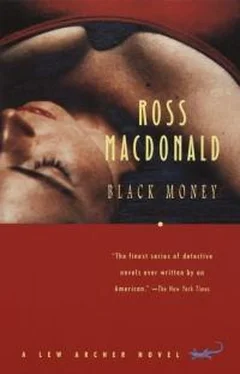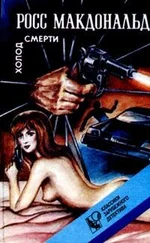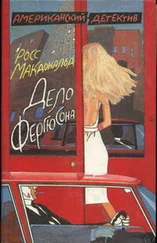Her voice was toneless. She might have been talking about a shopping trip. But her very flatness of feeling suggested the trauma that kept her emotions fixed. She said without much curiosity: “How did you find out about my pregnancy? I thought nobody knew.”
“It doesn’t matter how I found out.”
“But I only told Roy and Mother.”
“And they’re dead.”
A barely visible tremor went through her. Slowly, as if against physical resistance, she turned her head and looked into my face.
“You think they were killed because they knew about my pregnancy?”
“It’s possible.”
“What about Francis’s death?”
“I have no theory, Miss Fablon. I’m still groping in the dark. Do you have any ideas?”
She shook her head. Her bright hair swung, touching her cold pale cheeks with a narcissistic caress.
Peter said impatiently from the doorway: “May I come in now?”
“No, you may not. Go away and leave me alone.”
She stood up, including me in the invitation to leave.
“But you’re not supposed to be alone,” Peter said. “Dr. Sylvester told me–”
“Dr. Sylvester is an old woman, and you’re another. Go away. If you don’t, I’ll move out. Tonight.”
Peter backed out, and I followed him. She closed and bolted the door after us. When we were out of hearing of the cottage, Peter turned on me: “What did you say to her?”
“Nothing, really.”
“You must have said something to bring on a reaction like that.”
“I asked her a question or two.”
“What about?”
“She asked me not to tell you.”
“She asked you not to tell me?”
His face leaned close to mine. I couldn’t see it too well. He sounded wildly angry and belligerent. “You’ve got things turned around, haven’t you? You’re my employee. Ginny is my fiancée.”
“She’s kind of an instant fiancée, isn’t she?”
Perhaps I shouldn’t have said it. Peter called me a filthy crud and swung on me. I saw his fist arriving out of the darkness too late to duck it cleanly. I rolled my head away from the blow, diminishing its sting.
I didn’t hit him back, but I put up my hands to catch a second punch in case he threw one. He didn’t, at least not physically.
“Go away,” he said in a sobbing voice. “You and I are finished. You’re finished here.”
It was a moral hardship for me to walk away from an unclosed case. I went back to my apartment in West Los Angeles and drank myself into a moderate stupor.
Even so I didn’t sleep too well. I woke up in the middle of the night. A spatter of rain was rustling like cellophane at the window. The whisky was wearing off and I was myself in a flicker of panic: a middle-aging man lying alone in darkness while life fled by like traffic on the freeway.
I got up late and went out for breakfast. The morning papers reported no new developments. I went to my office and waited for Peter to change his mind and phone me.
I didn’t really need him, I told myself. I still had some of his money. Even without it, and even without his backing in Montevista, I could go out and work with Perlberg on the Martel killing. But for some important reason I wanted him to rehire me. I think in my nighttime loneliness I’d fathered an imaginary son, a poor fat foolish son who ate his sorrow instead of drinking it.
The sun burned off the morning fog and dried the pavements. My depression lifted more slowly. I went through my mail in search of hopeful omens.
An interesting-looking envelope from Spain had pictures of General Franco on the stamps and was addressed to Señor Lew Archer. The letter inside said:
“ Cordiales Saludos : This comes to you from far-off Spain to call your attention to our new Fiesta line of furniture with its authentically Spanish motif as exciting as a corrida, as colorful as a flamenco dance. Come see it at any one of our Greater Los Angeles stores.”
The piece of junk mail I liked best was a folder from the Las Vegas Chamber of Commerce. Among the attractions of the city it mentioned swimming, golf, tennis, bowling, water-skiing, eating, going to shows, and going to church, but not a word about gambling.
It was an omen. While I was still smiling over the folder, Captain Perlberg phoned me.
“You busy, Archer?”
“Not so very. My client lost interest.”
“Too bad,” he said cheerfully. “You could do us both a favor. How would you like to talk to Martel’s old lady?”
“His mother?”
“That’s what I said. She jetted in from Panama this morning and she’s screaming for us to release her son’s body, also for information. You know more about the background of the case than I do, and I thought if you were willing to talk it over with her, you could save us an international incident.”
“Where is she now?”
“She took a suite in the Beverly Hills Hotel. Right at the moment she’s sleeping, but she’ll be expecting you early this afternoon, say around two-fifteen? She’d make a nice client for you.”
“Who would pay me?”
“She would. The woman is loaded.”
“I thought she was from hunger.”
“You thought wrong,” Perlberg said. “The consul general told me she’s married to the vice-president of a bank in Panama City.”
“What’s his name?”
“Rosales. Ricardo Rosales.”
It was the name of the vice-president of the Bank of New Granada who had written the letter to Marietta telling her that there would be no more money.
“I’ll be glad to pay a visit to Mrs. Rosales.”
I called Professor Allan Bosch at Los Angeles State College. Bosch said he’d be happy to have lunch with me and brief me on Pedro Domingo, but he still had a time problem.
“I can drive out there, professor. Do you have a restaurant on the L.A. State campus?”
“We have three eating places,” he said. “The Cafeteria, the Inferno, and the Top of the North. Incidentally our name’s been changed to Cal State L.A.”
“The Inferno sounds interesting.”
“It’s less interesting than it sounds. Actually it’s just an automat. Why don’t we meet at the Top of the North? That’s on top of North Hall.”
The college is on the eastern border of the city. I took the Hollywood Freeway to the San Bernardino Freeway, which I left at the Eastern Avenue turnoff: The campus was a sort of chopped-off hill crowded with buildings. Parking spaces were scarce. Eventually I parked in a faculty slot, and rode the elevator six stories up to the Top of the North.
Professor Bosch was a youthful-looking man in his middle thirties, tall enough to play center on a basketball team. He had a big man’s slouch, and a bright disenchanted eye. His speech was staccato, with a Middle Western accent.
“I’m surprised you made it on time. It’s quite a drive. I saved us a place by the window.”
He led me to a table on the east side of the large buzzing room. Through the window I could see out toward Pasadena and the mountains.
“You want me to tell you what I know about Pedro Domingo,” Bosch said over our onion soup.
“Yes. I’m interested in him and his relatives. Professor Tappinger said his mother was a Blue Moon girl. That’s the Panamanian equivalent of a B-girl, isn’t it?”
“I guess it is.”
Bosch shifted his bulk in the chair and looked at me sideways across the table. “Before we go any further, why wasn’t Pedro’s murder reported in the papers?”
“It was. Didn’t Tappinger mention that he was using an alias?”
“Taps may have, I don’t remember. We both got excited, and we went round in circles for a while.”
His gaze narrowed on my face. “What alias was he using?”
Читать дальше







